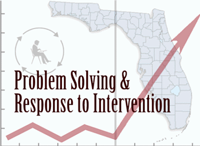
Florida’s first Problem Solving/Response to Intervention Newsletter has been released. It’s a great introduction to the concepts with clear messages about Florida’s direction. It is posted on the project Web site
Consider the following questions:
- What is RtI?
- What is the role of the school counselor in a problem-solving/RtI model?
- What are the training or skills needs of school counselors?
- Florida’s Project Problem Solving and Response to Intervention (RtI) state project website. In an effort to provide technical assistance and support to the state, the Florida Department of Education and the University of South Florida have partnered to create Florida’s Problem Solving/Response-to-Intervention Project. The focus of this project is two-fold: (1) To provide statewide professional development and technical assistance to districts engaged in or wishing to initiate PS/RtI projects, and (2) to provide direct support, training, and on-site coaching to six pilot districts.
- The Florida Department of Education developed a memorandum and technical assistance paper (TAP) which addresses RtI. The Memorandum K12: 2006-22 (2/27/06) may be viewed here.
- Other RtI Resources:Myths About Response to Intervention (National Association of State Directors of Special Education (NASDSE)
- Position statement from the American School Counselor Association.
- Articles & Free Pubs About Response to Intervention (RTI)
- RTI_WIRE, your ‘one-stop’ directory of free, high-quality ‘Response-to-Intervention’ resources available on the Internet!
- New Roles in Response to Intervention: Creating Success for Schools and Children (PDF)
- RTI Action Network
- A parent guide to RTI from the National Center for Learning Disabilities
- Response to Intervention and Positive Behavior Support: Brothers from Different Mothers or Sisters with Different Misters?
- At Miami-Dade, a district-wide RTI initiative yields strong results.
Response to intervention (RtI) is referenced in the Individuals with Disabilities Education Act (IDEA) reauthorization of 2004 as well as in the No Child Left Behind (NCLB) Act. RtI can be applied to all students who are not progressing in the core curriculum at an adequate rate. RtI is part of a problem-solving method that has been proven effective in both general and special education. RtI is defined as the change in behavior or performance as a function of an intervention. RtI represents a systemic method or evaluating the needs of all students and for fostering positive student outcomes through carefully selected and implemented interventions. It also may be used to assist schools and districts in identifying students who may require more intensive instructional services and/or be eligible for exceptional student education.
The following information is offered for your review:
Other RtI Resources:








